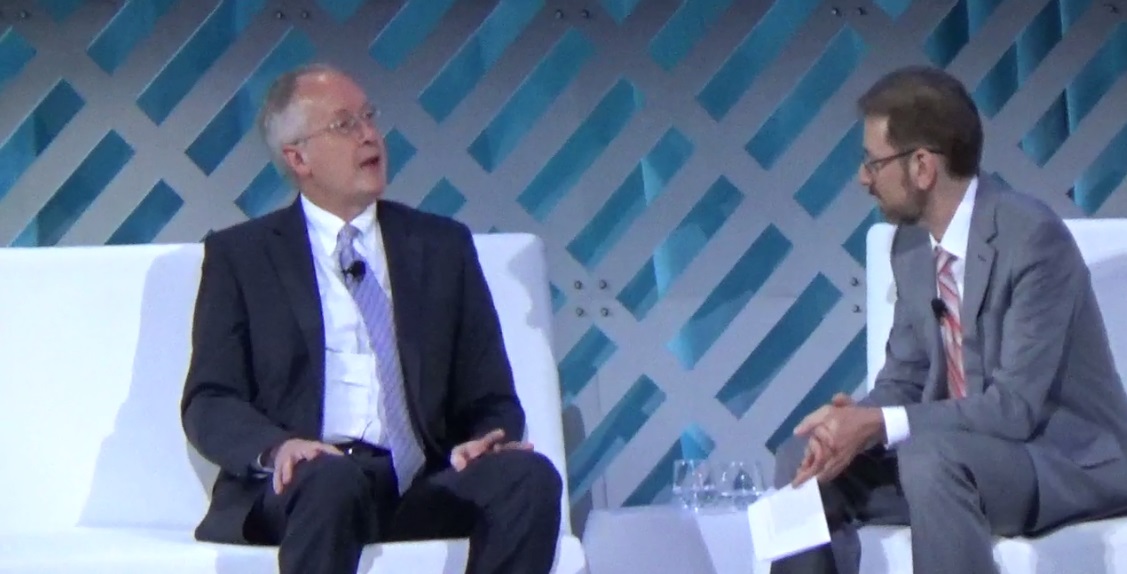Myron Ebell, director of the Center for Energy and Environment at the Competitive Enterprise Institute and a prominent denier of climate science, found himself on the receiving end of pronounced skepticism at a Bloomberg New Energy Finance (BNEF) Summit on Monday as he denounced a broad array of targets.
“My views on climate science are that I have a very profound respect for science, so I don’t have much respect for a lot of what passes as climate science,” Ebell said, prompting murmurs from a room packed with several hundred energy financiers and industry executives.
Ebell, who rocketed to national prominence when he was tapped to run Trump’s Environmental Protection Agency transition team, faced laughter and some quiet jeering as he conveyed his ideas about climate change and the economy to investors gathered at the BNEF Future of Energy Summit.
During his talk, Ebell labeled California’s economy “a disaster” because of its response to climate change, a claim that drew laughs from some in the crowd.
“The whole thing about the Obama election is he wanted to turn the United States economy into a model from California,” Ebell said. “A lot of the climate action plan is to turn Indiana, Ohio, Michigan into an economy resembling that of California, namely a disaster.”
Ebell’s remarks came less than an hour after Kevin de Leon, President pro Tempore of the California State Senate, had described job prospects in the renewable industry versus coal to the BNEF New Energy Finance Summit attendees.
“There are more clean energy jobs in California than there are coal mining jobs in the entire nation,” de Leon said, citing California’s over 500,000 jobs in the wind, solar, and “advanced energy” industries (a figure that includes a relatively small number of jobs related to natural gas).
California’s $2.46 trillion economic output made it the second-fastest growing economy in the U.S. in 2015, according to numbers released last year by the Bureau of Economic Analysis. “We’ve proved in California that the economy grows,” Gov. Jerry Brown said when those numbers were reported. “And it grows in part because of the climate rules that we’ve adopted.”
Nonetheless, Ebell talked up a gamble on coal as the fuel of the future, rather than renewables.
“Let’s see what happens if we get rid of the war on coal, and then let’s see if the coal industry has a future,” Ebell said. “I don’t know but it’s really up to them.”
Warm Winters Making Gas Industry Sweat
At the summit, Ebell emphasized his belief that the climate isn’t changing significantly.
That claim, it is worth noting, is contradicted by decades of temperature records.
“The planet’s average surface temperature has risen about 2.0 degrees Fahrenheit (1.1 degrees Celsius) since the late 19th century, a change driven largely by increased carbon dioxide and other human-made emissions into the atmosphere,” NASA noted in January of this year, as it pointed out that independent analysis by NASA‘s Goddard Institute for Space Studies and the National Oceanic and Atmospheric Administration (NOAA) showed that 2016 was the hottest year on record since 1880.
“I think that the impacts of warming have been either exaggerated or made up,” Ebell said at the BNEF summit. “I think most of the impacts are fairly mild and are likely to remain mild.”
Those impacts might not feel so mild to the natural gas drilling industry, which according to Mach Resources CEO Tom Ward, who also spoke at the BNEF summit, has suffered greatly in part because of warm winters that undermined demand for gas to heat homes.
Ward, who co-founded the beleaguered Chesapeake Energy with Aubrey McClendon, went on to helm the now-bankrupt SandRidge Energy and in January launched a oil and gas company called Mach Resources. He explained that low natural gas prices have been pushing drillers to the breaking point. “Three of the last five years have been the warmest winters since 1950,” Ward said, as he sought to explain why demand has been low and his companies have struggled to sell their gas at a profitable price.
A “Climate-Industrial Complex”?
Ebell decried the influence of technology on the American economy. “The technological industrial elite has been a problem for a long time,” he said.
He also described a “climate-industrial complex” that he said was overstating the threat of climate change and underestimating the costs of responding to it.
“So, the climate-industrial complex — tell me more about that,” the moderator, Ethan Zindler, head of America and Policy at Bloomberg New Energy Finance, carefully asked. Meanwhile, the audience — many top-level executives in wind or solar energy companies or investors who’ve put their own money on the line based on climate science — openly laughed.
“It’s become a very large thing now. It’s a huge global enterprise,” Ebell replied. “Lots of money is invested in it.”
There certainly is a large (and growing) amount of money being invested in renewable energy — no small amount of it coming from the very financiers, analysts, and executives that Ebell was addressing. But any suggestion that those industries manufactured the scientific consensus on climate change is to put the cart before the horse. As InsideClimate News pointed out in a Pulitzer-finalist investigation, oil giant ExxonMobil has known about the dangers of climate change for over 40 years — long before a significant renewable energy sector began to emerge.
For Ebell, however, the “climate-industrial” conspiracy extends far beyond the wind and solar industry. It includes advocates for science as well.
Asked whether the participants in the recent March for Science were also part of the climate-industrial complex, Ebell had a short answer.
“Many are,” he said.
Many in the room seemed unswayed by Ebell’s views.
“Myron Ebell is delusional,” Alex Wong, analyst at The Energy Authority, an energy trading company that deals in fossil fuels as well as renewables, wrote in a discussion forum for summit attendees.
Tillerson “Part of the Problem”
Whether or not those gathered were convinced by Ebell’s talk, there is no question that Ebell’s views carry far greater weight in Washington. “We thought it was important to have this conversation because Ebell’s perspectives are very much now in the discussion as we look at now future policy-making within the administration,” Zindler said. “Clearly the last election changed the dynamics in Washington a great deal.”
Ebell emphasized that he is no longer working for the Trump administration — and he was already critical of some of Trump’s decisions.
During his remarks, Ebell went on the offense against other members of President Trump’s cabinet, singling out former Exxon CEO Rex Tillerson, now Trump’s Secretary of State.
“The fact is that the people who voted for President Trump are not the CEOs of ExxonMobil, BP, Shell and Conoco Phillips,” Ebell said. “The people who voted for Trump and elected him think that those CEOs are part of the problem.”
It all seemed a little much to take in for some at the Future of Energy summit.
“I have a headache,” Susan Kich, master of ceremonies for the conference, joked to the crowd after Ebell left the stage.
Subscribe to our newsletter
Stay up to date with DeSmog news and alerts






